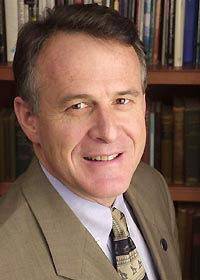|
This is an archived article.
For the latest news, go to the Advance
Homepage
For more archives, go to the Advance Archive/Search Page. |
||
As we prepare to implement 21st Century UConn, a task force will develop a plan to ensure that the building program supports our academic aspirations. The new academic year has begun with a study in contrasts. The excitement and anticipation of the impact that will result from the passage of the 21st Century UConn legislation is weighed against a significant cut in our operating budget. And we were thrilled to welcome thousands of new undergraduate students at the Storrs and regional campuses, even as we gathered in front of the Babbidge Library to honor the lives lost in the horrific events of September 11. An atmosphere of change is becoming the constant on UConn campuses. This holds true both for the physical changes that continue to occur and for the ways in which we approach our academic success.
Later this fall, a task force co-chaired by Karla Fox, Associate Vice Chancellor, and a faculty member will begin the process of developing an academic plan for the University. The task force, comprised of 11 faculty members and an honors student, has been charged with reviewing and recommitting to the goals as set forth in the Strategic Plan that the Board of Trustees endorsed and implemented in 1995. In collaboration with these overarching goals, the task force will develop a road map by which our academic programs will continue to be built and nurtured and make UConn a top-ranked public university. The passage of the 21st Century UConn legislation requires the University, as the steward of the building program's success, to make wise and informed choices about the most appropriate way in which to roll out a succession of building projects. The sequencing of these projects should clearly support our academic goals. The task force will need to work expeditiously, yet thoroughly, to do an adequate audit of our current academic offerings and configurations, review relevant data from both internal and external sources, and make recommendations to the administration regarding the next evolution of academic programming. The task force will also work with the deans and other non-academic bodies for a comprehensive approach to forming their recommendations. I expect that this will be an interactive and continuing process and anticipate being able to unveil a final plan by next summer. I envision this as a collaborative process which will afford checkpoints along the way for open and honest discussion by the entire campus community about the plan's formation, content, and impact on our current operation. While I anticipate that we will have the opportunity for as much input as possible, the nature of a building schedule under the 21st Century UConn legislation may require that we rely heavily on your colleagues on the task force to relay a broad approach to the plan's development. I believe we have gathered a fine working group who bring a host of diverse perspectives, strategic thinking and innovative ideas. As part of our ability to formulate and implement a successful academic plan, we must continue to rely heavily on a strong infrastructure and be certain that it is aligned with academic goals. One of the more critical elements of the University's infrastructure is an efficient and effective information technology services area. This holds true not only in the academic areas but also for the University's business operations, for synergies with the UConn Health Center, and generally for our ability to support the research initiatives that are at the heart of this institution's mission. Effective September 3, Randy Bell assumed the position of interim vice chancellor of information technology. Randy joins us from the Pappas Consulting Group, where he holds the position of vice president, and was most recently the consultant who completed a comprehensive review of our current information technology operation. He has a wealth of experience working with education and non-profit institutions with regard to their information technology needs. Randy was formerly with the University of Massachusetts, where he served as assistant vice chancellor for administrative re-design for both the Lowell and Boston campuses. I am confident that he will be able to guide the development of a strategy on how the information technology services unit will be operationally sound in adequate time to fully support the goals which result from the academic planning process. Brinley Franklin will continue to manage the daily operations of the Library. The year ahead will offer us both challenge and success, as we continually refine and refocus on short and long-term goals. As with every dynamic organization, positive change happens only when we challenge ourselves to think and act differently than we have in the past. Challenge the status quo, motivate your students and work together toward common goals. I look forward to working with each of you in the upcoming year. |

